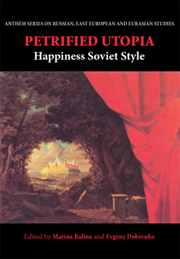Book contents
- Frontmatter
- Contents
- List of Illustrations
- Acknowledgments
- List of Contributors
- Introduction
- Petrified Utopia
- Part One Utopics
- Part Two Realities
- 5 ‘It's Grand to be An Orphan!’: Crafting Happy Citizens in Soviet Children's Literature of the 1920s
- 6 Sew Yourself Soviet: The Pleasures of Textile in the Machine Age
- 7 Happy Housewarming!: Moving into Khrushchev-Era Apartments
- 8 When We Were Happy: Remembering Soviet Holidays
- Part Three Locations
- Notes
- Index
5 - ‘It's Grand to be An Orphan!’: Crafting Happy Citizens in Soviet Children's Literature of the 1920s
from Part Two - Realities
Published online by Cambridge University Press: 05 March 2012
- Frontmatter
- Contents
- List of Illustrations
- Acknowledgments
- List of Contributors
- Introduction
- Petrified Utopia
- Part One Utopics
- Part Two Realities
- 5 ‘It's Grand to be An Orphan!’: Crafting Happy Citizens in Soviet Children's Literature of the 1920s
- 6 Sew Yourself Soviet: The Pleasures of Textile in the Machine Age
- 7 Happy Housewarming!: Moving into Khrushchev-Era Apartments
- 8 When We Were Happy: Remembering Soviet Holidays
- Part Three Locations
- Notes
- Index
Summary
Among the most vulnerable citizens of the new Soviet state in its first decade were its children: abandoned by their families who for various reasons were not able to care for them, displaced from their homes by the Civil War, or simply lost in the constant migrations (the rural population going into big cities in search of a better life, or people leaving the cities for the villages, hoping to find food), these ‘little comrades’ became the first targets of the Soviet project that sought to make the ‘new man’. Two fictional works of Soviet children‘s literature-both of which confirmed the success of revolutionary rebirth-became testaments to the struggle of the street children in the early days of the Revolution: SHKID Republic (Respublika SHKID, 1926), by Grigory Belykh and Leonid Panteleev; and Pedagogical Poem (Pedagogicheskaia Poema, 1933,1936), by Anton Makarenko. The first, written by two former delinquents, describes the rigorous life in the school for young criminal offenders that bore Dostoevsky‘s name (the abbreviation SHKID comes from the Russian shkola imeni Dostoevskogo-‘Dostoevsky School’). It was a highly romanticized picture of life in the ‘republic’ where self-governance and trust were integral parts of human existence, and it celebrated the freedom and creativity of its young citizens.
- Type
- Chapter
- Information
- Petrified UtopiaHappiness Soviet Style, pp. 99 - 114Publisher: Anthem PressPrint publication year: 2009



